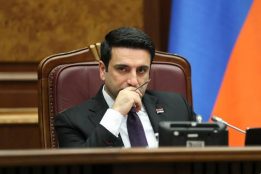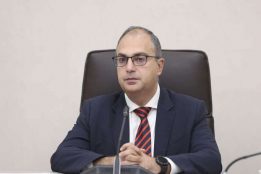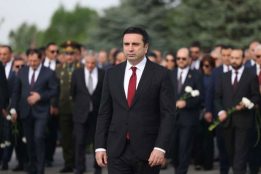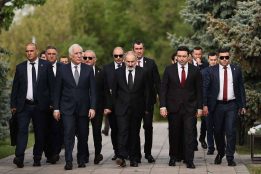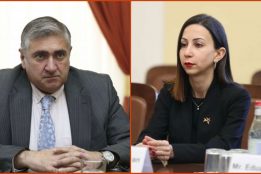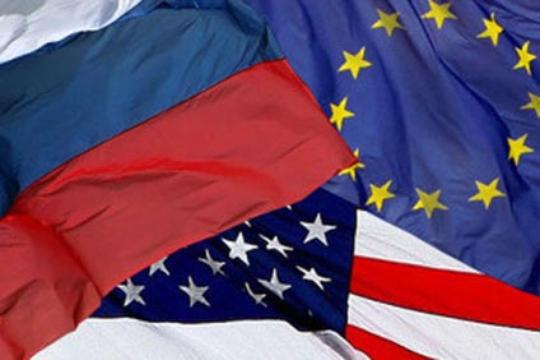
Dr. Dan Steinbock, Research Director of International Business at India, China and America Institute (USA), published an article on EU-Russia-U.S. relations. Find the article below.
At the eve of the EU-Russia Summit, trade tension has been rising between Brussels and Moscow. It is in the interest of both the EU and Russia to learn to manage such differences and to agree to disagree.
Brussels has threatened to take Moscow to the World Trade Organization as Russia is now a member of the WTO, after two decades of talks.
According to the EU Trade Commissioner Karel De Gucht, Russia unfairly levies fees on imported vehicles, bans EU exports of live animals and overall makes it prohibitively expensive to exports hundreds of products, including wood.
According to Russia’s WTO chief negotiator Maksim Medvedkov, EU is violating WTO rules over its Third Energy Package, which prohibits energy suppliers owning distribution networks in Europe, and anti-dumping measures and restrictions on the transit of Russian goods. EU is Russia’s biggest trading partner and a major buyer of Russian energy. In turn, Russia buys 10 percent of EU farm exports.
Both parties are preparing for a tense EU-Russia summit in Brussels on 21 December.
Lingering growth in the near-term
Prior to global recession in 2008-2009, Russia enjoyed almost a decade of strong growth. Even inadequate industrial diversification did not matter as long as Russia’s energy supply was supported by thriving world trade.
With the negative demand shock in the West, Moscow’s growth model crumbled. Despite a relatively strong first half of 2012, Russian growth is suffering from weak external demand, due to the stagnation in its vital export markets, and lower agricultural output.
As investment is eroding and Moscow’s strategic maneuverability is reduced, consumption has been the leading driver. But now it, too, is softening. Accelerating inflation has compelled Russia’s central bank to resort to rate hikes, which, in turn, have an adverse impact on consumption.
As moderately expansionary fiscal policy is preparing way to caution and tightening, social pressures toward reforms are likely to increase, but political outcomes are uncertain, which is not slowing capital outflows.
Since 2010, the capital flight from Russia has doubled to $75 billion. At the same time, lingering corruption and poor investment climate reduce Russia’s attractiveness for investment.
Political consolidation, middle-class protest
In the past four years, Russian fortunes have been the result of the fluctuations in the West. Energy booms go hand in hand with thriving global markets. Near-term prospects are not promising.
At the same time, the emerging middle-class, which owns its existence to Putin’s economic policies in the decade prior to the global crisis, has become increasingly vocal, pushing for faster political reforms.
While the reform-minded middle class is central to hopes in the West, it represents neither Russia as a whole nor its most powerful political pressure groups, such as liberals, nationalists, or socialists.
Putin’s reduced popularity has less to do with viable alternatives than rising food prices and poor management of floods and protests. Further, opposition forces remain fragmented, which permitted United Russia to reign over the local elections, while low turnout may reflect a silent popular protest.
Ironically, the amplification of democratic voices in Russia is making democratic progress more difficult. Political fragmentation does not support a consolidated political push. Meanwhile, Moscow has responded with restrictions and punitive legislation.
At the same time, Putin has taken the first steps to discipline the post-oligarch rich and to engage in real anti-corruption struggle – as evidenced by the dismissal of defense minister Anatoly Serdyukov amidst corruption allegations.
Similarly, Putin’s recent proposal to curb officials from holding foreign assets reflects a broadening campaign against corruption.
Russia as a BRIC
“The situation when the Russian budget depends on foreign financial and commodity markets is unacceptable,” Putin said during his annual address to the Federal Assembly. “It’s important to return the country to a leading position in key industries and in middle business.”
In the footprints of Medvedev, he asked the government to prepare “road maps” for accelerated development of high-tech branches of the economy such as biotechnologies, rare earth metals, gene engineering, urban building and IT. The measures are crucial for the Russian economy to achieve a 6% growth target.
Putin’s multipolar objective is to develop a free market economy, but not capitalism. As a transitional economy, it has more in common with the former Third World.
Since 2001, Russia has been characterised as a large emerging economy; a ‘BRIC,’ such as China, India, and Brazil. Until the global recession, it represented typical ‘BRIC’ strengths: a large population, seemingly sustained growth, and macroeconomic stability.
While Russia continues to retain many of its strengths, the negatives have become more apparent in the past half decade: declining population, energy-led growth, and eroding stability.
In 2012, Russia’s growth is likely to continue at 4 percent, on the back of high oil prices. However, even if prices remain at $80 a barrel, the economy is at risk of overheating in the short-term. In the medium-term, stability requires reduced inflation and improved investment climate to diversify its industrial structure.
Washington’s Russia reset
Interestingly enough, as the EU is preparing for a trade spat, US Senate has moved forward to grant permanent normal trade relations with Russia, after overwhelming support from the House for the measure to lift Cold War-era trade restrictions and President Obama’s pledge to sign the bill.
In Washington, the measure is seen as a way to support US jobs as American multinationals seek participation in new markets amidst stagnation at home. In addition to strengthening economic relations with Russia, US policymakers will seek to cooperate with Moscow on regional issues, including in the Arctic and the North Pacific, while trying to reach an agreement on US-NATO cooperation in missile defence.
The bilateral “reset” was first proclaimed already in 2009. The past years, however, have eroded its promise. The achievements — the new START Treaty, cooperation on Afghanistan and Iran, Russia’s entry into the World Trade Organization — have been replaced by persistent differences and vocal rhetoric over Syria, Iran and other high-profile issues.
In his first term, President Obama had to focus primarily on the economy. And while it remains his central concern, he will now also work on his legacy. As a result, he will seek to reverse the deterioration in bilateral relations, perhaps by demonstrating the kind of “flexibility” he promised Russian leaders earlier this year.
For his part, Putin has begun talking about giving the relations “a new quality” by adding a strong economic dimension. A potential second phase of the reset could witness more deals of the kind Exxon Mobil struck with Rosneft.
In August, the US-based company snatched away a major Arctic exploration deal with Rosneft from rivals, such as BP which sought the deal earlier in the year, as well as Chevron, Total SA, and Statoil ASA. Signed in Putin’s vacation residence on the Black Sea, the deal gives the Russian-state controlled company access to energy projects in the US.
… and re-reset
Washington would like to leave behind the Cold War legacies in economic, regional and strategic issues. In turn, Moscow’s leaders understand that the global energy equation may shift. While the EU and Japan will remain reliant on Russian energy supplies, recent shale gas discoveries are likely to strengthen US energy position – though not without huge risks.
Last Friday, President Obama signed into law the Magnistky Act, named after the whistleblowing lawyer, who died in a Moscow jail three years ago, after he had alleged large-scale systematic theft from the Russian Government sanctioned by officials before being himself arrested on tax fraud charges.
The Act will penalise Russian officials for human rights violations that US legislators linked to a landmark bill, which will formally establish permanent normal trade relations (PNTR) with Russia.
President Obama’s quest for change in America is real. Initially the administration was reluctant to link the Act to the trade legislation. However, as the bill enjoyed strong bipartisan support, the White House could not intervene without endangering that consensus. It desperately needs bipartisan momentum for a fiscal cliff deal.
Conversely, Russia pledged to impose analogous restrictions against US officials in response to the Act, which in Moscow united fragmented forces as the lower house of the Russian parliament gave preliminary approval to a draft law penalising US nationals involved in violating the rights of Russian citizens.
Recently Yevgeny Primakov, former Russian PM and intelligence chief, noted that, after Guantanamo prison, Washington had its “American disgrace,” but suggested that the Magnitsky Act would not have serious effect on Russia-US relations.
That conclusion, however, is predicated on the assumption that the bill remains a bilateral anomaly rather than a trigger for a trilateral tit-a-tat chain reaction.
Resetting the re-reset
As sustaining internal integration will take years, Brussels has little time for external friction, especially with Russia. Conversely, Moscow should seek greater rapprochement with Brussels now that its bargaining position is still relatively strong.
In the post-crisis environment, old bargaining positions no longer hold. From the EU standpoint, Russia’s energy power will decline over time. In Russian view, Brussels no longer has either economic might or moral pretext to lecture to Moscow.
Most importantly, the real issues are no longer bilateral. In the long run, the relative economic and strategic importance of both the EU and Russia will decline in the world economy. The real question is whether Russia or the EU will be the first to embrace the multipolar future – and the requisite tradeoffs.

















